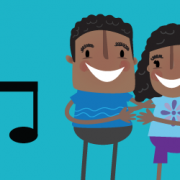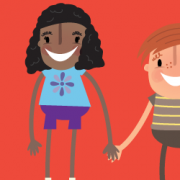Choose five “treasured” items to hide (such as favourite toys, stuffed animals or special treats). When your children find their treasures, they’ll also find a quiz question taped to each item. When they put all their questions together, they’ll uncover the joy-filled message of salvation! (You’ll find the list of quiz questions at the end of this activity.)
To prepare your scavenger hunt, first pray and ask the Holy Spirit to give your children understanding of the truth of the good news of salvation and, if they have not yet done so, pray that they would accept it.
Next, print out a copy of each the numbered quiz questions (see text provided below).
Tape one clue to each of the five items that will be hidden in the room. (Or, to reduce competition, you can hide five items per child, rather than have all the children search for the same five items.) The quiz questions do not need to correlate to the items that will be hidden.
Before the hunt begins, let your children know where the search boundaries are. Tell them that the questions they find on their treasured items will help them uncover the answer to the bigger question, What is the greatest treasure in the whole world?
Have your children search until they find all the hidden items. Provide assistance as needed, using the terms “hotter” and “colder” to provide direction.
When your children have found all their treasures, help them place the treasures in order, one through five, according to the numbers on the quiz questions.
Ask your children if they can think of a story in the Bible that tells about a person losing a special possession. Take a few minutes to read The Parable of the Lost Coin from Luke 15:8-10. Compare your children’s hunt for their treasures to a parent looking for a lost child, or to God seeking “lost children.”
Note: If your kids show avid interest, you can conduct the treasure hunt a number of times before reviewing the quiz questions.
Questions for discussion
- What did the woman in the story lose?
- What did she do when she found it?
- How hard was it to find all your treasures?
- What did you do when you found everything that had been hidden?
- What does the Bible say is the reason for rejoicing in heaven?
- What is the difference between a person who is “lost” and a person who is “found”?
- Has Jesus found you or is He still looking for you?
Key concepts
When we lose something of value, we search for it diligently until we find it. God is like a parent who loses a child: He searches for that lost child until he or she is found.
A person who is “lost” is someone who has not admitted that he or she is sinful and has not asked God to forgive their sins. They don’t know what it means to have Jesus as a friend and have not asked God to be the leader of his or her life. Many people in our world are “lost.” They don’t know that the greatest treasure in the world is knowing and loving Jesus, so they go hunting for other treasures, trying to make themselves happy in other ways.
Treasure hunt questions
Question 1
Who made you? How do you know if God loves you?
Key concept
God made each of us and He considers every person to have equal value. He loves each of us simply because He does.
Relevant Scripture
Genesis 1:27 “So God created man in His own image, in the image of God He created him; male and female He created them.”
Colossians 1:16 “For by Him all things were created: things in heaven and on earth, visible and invisible, whether thrones or powers or rulers or authorities; all things were created by Him and for Him.”
John 3:16-17 “For God so loved the world that He gave His one and only Son, that whoever believes in Him shall not perish but have eternal life. For God did not send His Son into the world to condemn the world, but to save the world through Him.”
Question 2
Does God love you even if you have sinned? What kind of things do we do that are called sin? How do you think God feels about sin?
Key concept
As much as God loves us, He does not love our sin.
Relevant Scripture
Genesis 6:5-8 “The Lord saw how great man’s wickedness on the earth had become, and that every inclination of the thoughts of His heart was only evil all the time. The Lord was grieved that He had made man on the earth, and His heart was filled with pain. So the Lord said, ‘I will wipe mankind, whom I have created, from the face of the earth – men and animals, and creatures that move along the ground, and birds of the air – for I am grieved that I have made them.’ But Noah found favor in the eyes of the Lord.”
Romans 3:22-24 “This righteousness from God comes through faith in Jesus Christ to all who believe. There is no difference, for all have sinned and fall short of the glory of God, and are justified freely by His grace through the redemption that came by Christ Jesus.”
Romans 3:22-24 (paraphrased for younger readers) “Every person sins and no matter what a person does, they can’t get rid of their sin. It is impossible. All of us who sin deserve to die, but God sent Jesus to take the punishment for our sins. Jesus died so that we don’t have to. This great gift is called “grace.” Even though we don’t deserve to be forgiven, God forgives us and sets us free from our sin simply because He loves us!”
Question 3
Do you have a choice about what to eat at suppertime? How about snack time? What kinds of choices do we (your parents) give you? Can you choose to obey or disobey? What happens if you disobey? Does God force you to obey Him? Does God make you love Him?
Key concept
Every person has a choice to make in life: a choice to ask God to forgive their sins, to follow God and obey His commands, or a choice to live following their own plans and pleasing themselves.
Relevant Scripture
2 Peter 3:9 “The Lord is not slow in keeping His promise, as some understand slowness. He is patient with you, not wanting anyone to perish, but everyone to come to repentance.”
1 John 1:9 “If we confess our sins, He is faithful and just and will forgive us our sins and purify us from all unrighteousness.”
Joshua 24:15 “But if serving the Lord seems undesirable to you, then choose for yourselves this day whom you will serve, whether the gods your forefathers served beyond the River, or the gods of the Amorites, in whose land you are living. But as for me and my household, we will serve the Lord.”
Question 4
What does God say will happen to those who choose to disobey or ignore Him? What will happen to those who love and obey God and His Word?
Key concept
God has made it very clear that those who believe that Jesus’ death paid the penalty for their sins, who love Him and follow Him, will spend eternity in heaven with Him. Those who don’t let God know that they are sorry for sinning, and who choose to live to please themselves, will not be able to go to heaven because their sins have not been forgiven.
Relevant Scripture
John 1:12 “Yet to all who received Him, to those who believed in His name, He gave the right to become children of God . . .”
John 3:16-17 “For God so loved the world that He gave His one and only Son, that whoever believes in Him shall not perish but have eternal life. For God did not send His Son into the world to condemn the world, but to save the world through Him.”
Question 5
How can God tell if we love Him?
Key concept
The questions God wants us to answer for Him include: Do you love Me? Are you ready to admit that you sin? Does it make you sad to see how much your sin disappoints Me? Do you want Me to forgive you? Am I your king, or are you living to please yourself instead of Me? (John 14:15,21).
Relevant Scripture
John 14:15,21 “ ‘If you love Me, you will obey what I command. . . . Whoever has My commands and obeys them, he is the one who loves Me. He who loves Me will be loved by My Father, and I too will love him and show Myself to him.”
For another story that helps explain salvation to your children, see “the parable of the lost sheep” in the Bible stories section of the forgiveness lesson.









